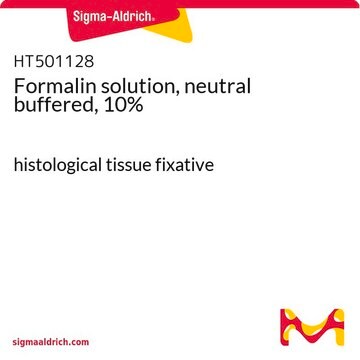1.04002
Formaldehyde solution
37%, EMPROVE® EVOLVE
Pharma Manufacturing
Synonym(s):
Formaline solution, Methanal solution, Methylaldehyde solution
About This Item
Recommended Products
description
stabilized with about 10% methanol Ph Eur,BP,USP
Quality Level
product line
EMPROVE® EVOLVE
form
liquid
autoignition temp.
300 °C (Formaldehyde)
expl. lim.
7-73 % (v/v) Formaldehyde)
concentration
36.5-38% (iodometric)
37%
pH
2.8-4.0 (20 °C in H2O)
bp
93-96 °C/1013 hPa
mp
<-15 °C
transition temp
flash point 62 °C (Formaldehyde)
density
1.09 g/cm3 at 20 °C
application(s)
histology
pharma/biopharma processes
pharmaceutical
storage temp.
15-25°C
Related Categories
General description
Application
Linkage
Legal Information
Not finding the right product?
Try our Product Selector Tool.
Signal Word
Danger
Hazard Statements
Precautionary Statements
Hazard Classifications
Acute Tox. 2 Inhalation - Acute Tox. 3 Dermal - Acute Tox. 3 Oral - Carc. 1B - Eye Dam. 1 - Muta. 2 - Skin Corr. 1B - Skin Sens. 1 - STOT SE 1 - STOT SE 3
Target Organs
Eyes,Central nervous system, Respiratory system
Storage Class Code
6.1A - Combustible acute toxic Cat. 1 and 2 / very toxic hazardous materials
WGK
WGK 3
Flash Point(F)
143.6 °F - closed cup
Flash Point(C)
62 °C - closed cup
Certificates of Analysis (COA)
Search for Certificates of Analysis (COA) by entering the products Lot/Batch Number. Lot and Batch Numbers can be found on a product’s label following the words ‘Lot’ or ‘Batch’.
Already Own This Product?
Find documentation for the products that you have recently purchased in the Document Library.
Customers Also Viewed
Our team of scientists has experience in all areas of research including Life Science, Material Science, Chemical Synthesis, Chromatography, Analytical and many others.
Contact Technical Service









